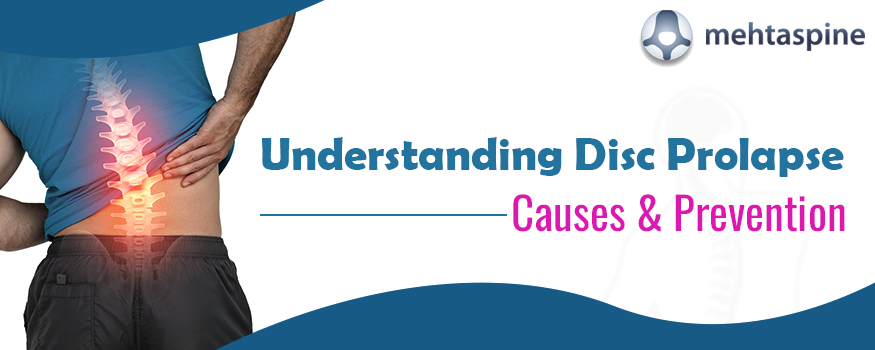Understanding Disc Prolapse: Causes, Complications & Prevention
The term “disc prolapse” may sound medically technical and the words “slipped,” “herniated,” or “bulging” discs make it more relatable and widely understood. In truth, all these conditions fall under “disc prolapse,” which has multiple names, and these terms are interchangeably used to describe the condition.
So, What Is a Disc Prolapse?
The discs between the vertebrae provide the cushioning and much-needed flexibility for the vertebral column. The discs are tough yet soft, flexible cushions due to their anatomy of a soft inner layer and a tough outer layer. Disc prolapse can happen when the damaged or weakened outer layer lets the soft inner core protrude and dome out of the disc, interfering with surrounding tissues and other spinal elements.
“This prolapsed disc can put pressure on the surrounding nerves, causing interference that may result in pain, numbness, or weakness in the arms, legs, and other body parts controlled by those affected nerves. The pain, weakness, and other symptoms tend to worsen when the patient stands, walks, or performs other physical movements,” says the disc prolapse specialist in UK, Mr. Jwalant S. Mehta.
Disc Prolapse: Causes & Complications:
Age-related wear and tear of the spinal disc, trauma from lifting heavy objects are some common causes of disc prolapse. Being overweight, smoking, prolonged sitting, and even lack of exercise can increase the risks of disc prolapse in healthy individuals.
Disc prolapse usually starts with pain, weakness, and numbness in the arms, legs, or bowel problems, which are also primary symptoms. When left untreated, this disc prolapse may go on to cause nerve damage and chronic pain, significantly damaging the quality of life of an individual.
“When the prolapsed disc compresses the nerves at the bottom of the spine, it may also result in Cauda equina syndrome, which leads to the loss of bladder and bowel control, sexual dysfunction, and paralysis in the legs,” according to an orthopaedic spine surgeon in UK, Mr. Jwalant S. Mehta.
Prevention Tips That Reduce the Risk of Disc Prolapse
Rest, physical therapy, medications, and even surgery are used to treat disc prolapse problems and avoid complications. While these treatment options effectively reduce the risk, prevention is always prioritized regarding disc prolapse or other spine conditions. Fortunately, with a few prevention tips, one can drastically reduce the risk of prolapse, as follows:
Maintain a good posture: Bad posture puts uneven and excessive stress and pressure on the discs, making them vulnerable to damage and prolapse. Be mindful of your posture and practice good poses, as spine specialists suggest.
Take breaks from prolonged sitting: Prolonged sitting places more significant strain on the lower back discs, reducing their blood flow and weakening the supporting muscles, increasing the risk of disc prolapse. Taking a break every 30 minutes of seated activity is always advisable.
Avoid smoking: Smoking tends to reduce blood supply, diminish nutrients, and weaken the support system of the spine, leading to an increased risk of disc prolapse. Given the prominence of smoking in active men, avoiding or reducing smoking also helps in reducing the risk of disc prolapse.
Maintain a healthy weight: Being overweight can also put excessive stress and strain on the back, increasing the risk of disc problems. “We always advise patients, especially in the age group 30-50, to maintain a healthy weight to decrease the chance of disc prolapse,” says back pain specialist and orthopaedic spine surgeon Mr. Jwalant S. Mehta.
Exercise, but with caution: Staying active with exercise can act as an antidote for prolonged sitting by strengthening the support system of the back. Strength and flexibility training fortify the back, reducing the risk of disc prolapse. However, strength training without proper form can increase the chance of back injury, raising the risk of disc prolapse. Ensure correct and optimal form by seeking help from right trainers.
In many cases, patients, due to a lack of awareness, may already succumb to back pain problems and even early-stage disc prolapse. In such cases, early diagnosis and treatment heighten the chance of recovery and lower the risk of complications. If you live in and around the UK and are looking for treatment for disc prolapse, you can contact orthopaedic spine surgeons and disc prolapse specialists in the UK, Mr. Jwalant S. Mehta


